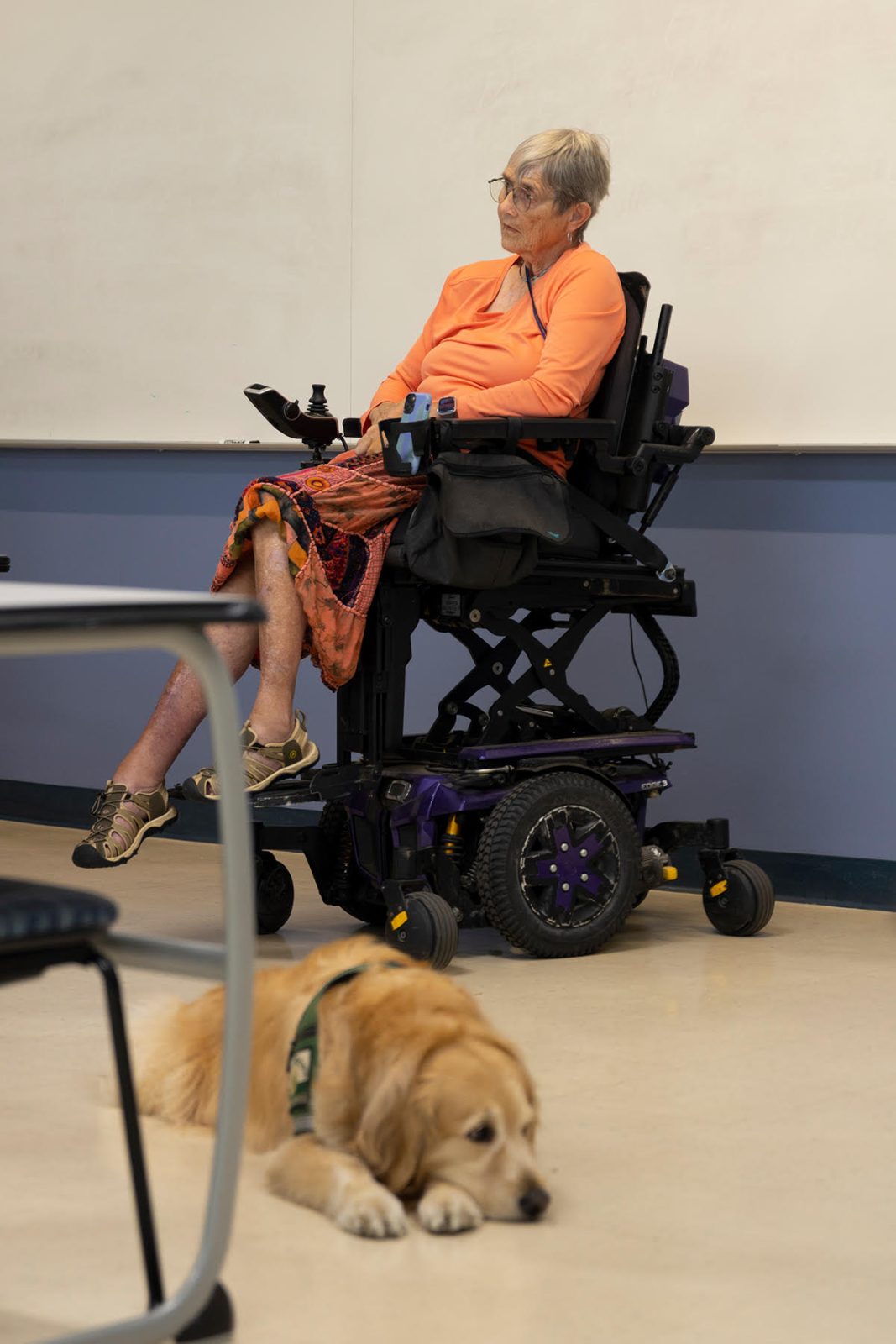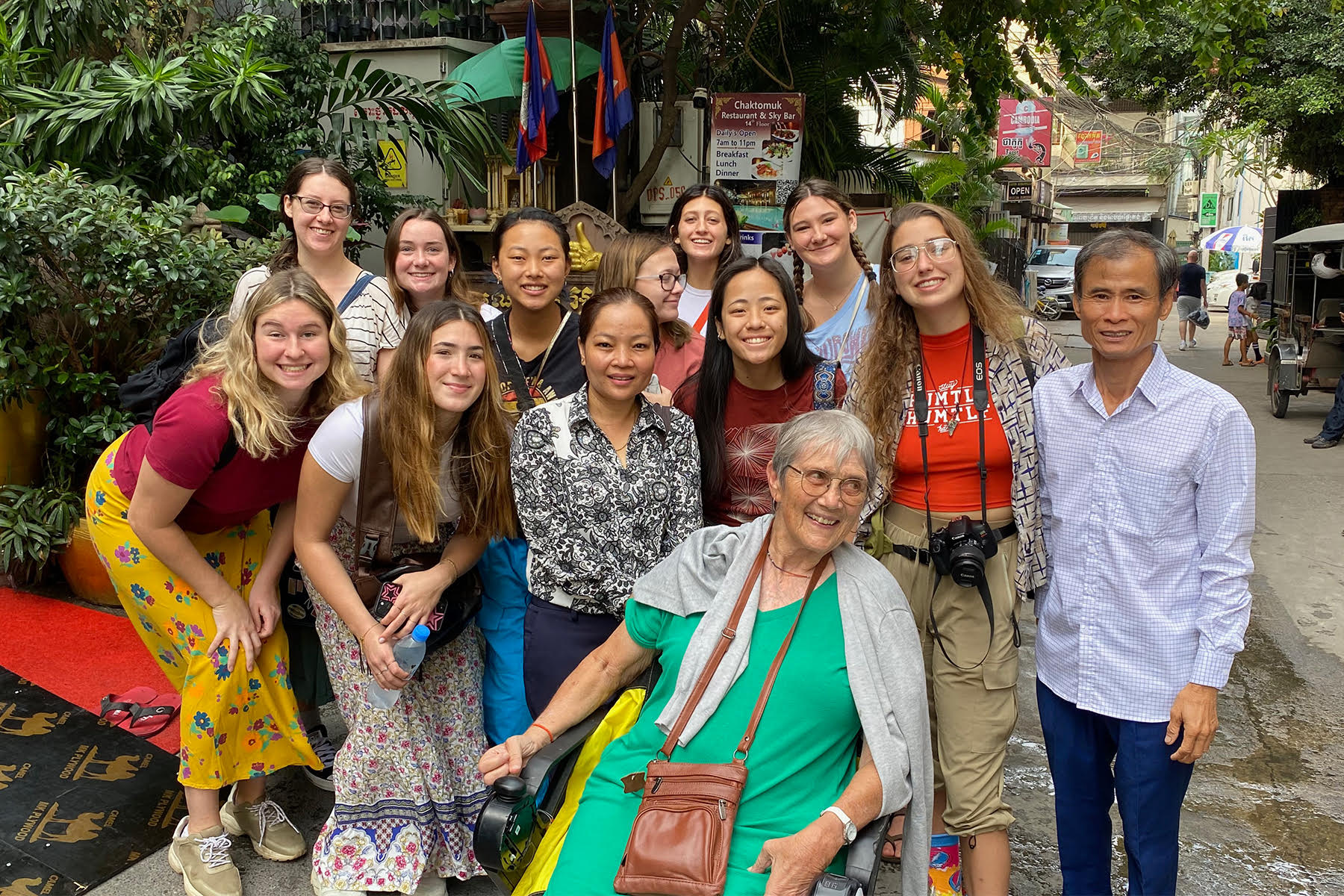Nancy Janus, Ed.D., wanted to squeeze in one more trip with her students to Cambodia before she retires this summer. It will be her ninth visit, and like many of them, it will be a struggle for her at times. But she insists that her work—shining a light on child sex trafficking—is far too important to miss this opportunity.
A professor of human development at Eckerd College, Janus will close out 29 years of teaching at the College on May 30 when she leads a group of four Eckerd students—along with her husband and her service dog, a golden retriever named Fajita—to Cambodia. Janus and her students will spend three weeks studying the conditions that impede progress in ending child sex trafficking.
Because of injuries sustained in a bicycle accident in 2012, Janus has to rely on a wheelchair. That can be a formidable obstacle in rural areas of Cambodia. But with the help of her husband, her dog and the kind people around her, what could be difficult or even impossible is made easier.
“I started out doing the Winter Term trips in 2003, focusing on women’s issues and looking at adoption in Cambodia and Thailand,” says Janus, who has three adopted daughters from Colombia. “That led me into reading about human and child sex trafficking globally. As a former Peace Corps volunteer in Tunisia, I have always been interested in global issues. Then I started reading about human and child sex trafficking in Cambodia.”
In 2019, Janus received a research grant from ASIANetwork, a consortium of more than 150 North American colleges, including Eckerd, that promotes education about Asia within the liberal arts. “Our member colleges,” the group’s website explains, “prepare their undergraduates for a world in which Asian societies play prominent roles in an ever more interdependent world.”

Professor of Human Development Nancy Janus and her service dog, Fajita, travel and work together.
The pandemic canceled that 2019 trip, but Janus was able to extend the grant to this year. “The proposal is a study of social and cultural issues in Cambodia that may make it difficult to eradicate child sex trafficking,” she explains. “Cambodia is a destination spot for people looking for sex with children. We’re going to be trying to learn what historical and sociocultural issues unique to Cambodia may perpetuate the problem. Cambodia is a very poor country, and the easy reason that sex trafficking doesn’t go away is poverty.”
But Janus says she and her students want to look deeper, including what effects the genocide that took place in Cambodia in the 1970s had on trafficking.
Families sell their daughters to traffickers or johns,” Janus says. “That behavior is not common throughout the world. So what other issues might contribute to the large amount of sex trafficking that exists there?”
The group plans to conduct interviews at several locations—including two leadership centers for young Cambodian women run by the Harpswell Foundation, a nonprofit based in Concord, Massachusetts. The centers, located in Phnom Penh, offer young women a safe place to live and study. “We’ll be interviewing those girls about sex education and women’s roles in Cambodia,” Janus explains. “The interviews are made easy because the Harpswell girls are the same age as my students, and they speak excellent English.”
Although brothels have been outlawed in Cambodia, child prostitution continues to be a major problem. A recent UNICEF survey concluded that 35% of Cambodia’s 15,000 prostitutes are children under the age of 16. “A young woman’s family will be promised that their daughter will get a job as a hotel housekeeper, for instance, only to wind up under the direction of a trafficker,” Janus says.
“Sex is not something easily discussed in most Asian cultures,” she adds. “We’re going to do our very best to learn as much as we can and find out what various nongovernmental agencies and the government are doing in terms of preventing child sex trafficking. The Cambodian government has an anti-trafficking office, and there are good people there. But there is enormous corruption in Cambodia.”
Raised in Chicago, Janus’s father died when she was 3, and her mother remarried a man who was a vice president of the Wrigley Company, the largest maker of chewing gum in the world. “I grew up with lots of gum,” she says with a chuckle. She received her bachelor’s degree in French from Wells College in New York, her master’s degree in school psychology from the University of Hartford, and her Doctor of Education in counseling psychology from the University of Massachusetts. After teaching for 12 years at Southern Connecticut State University, she arrived at Eckerd in the fall of 1994.
A sense of urgency has been a constant companion since Janus’s first visit to Cambodia. When she was able to return to Eckerd after her accident in the fall of 2013, she resumed her trips and taught human trafficking every semester. “After the accident, I was worried I wouldn’t be able to travel with students anymore,” she says.
That was hardly the case. Along with Winter Term trips to Cambodia, in the fall of 2017, Janus was part of the Semester at Sea study abroad program. She taught courses in lifespan development and led field classes in Ghana, China and India. “I did that with Brian’s help,” she says, referring to her husband, Brian Berry. “He’s been amazing. One of the things the accident taught me was that I married the right guy.”
Now she is preparing for what she calls her “swan song”—her last Eckerd-connected trip to Cambodia. She has selected to travel with her Simi Matsil, a first-year student from Harwinton, Connecticut; Riley Bloom, a sophomore communication student from Chappaqua, New York; Alexis Wathen, a junior psychology and political science student from Kenneth City, Florida; and Maggie Taishoff, a senior visual arts and human development student from McLean, Virginia.
“Nancy has such a drive to do so much and keep broadening her knowledge,” says Riley, who accompanied Janus on her Winter Term trip to Cambodia in January. “She genuinely cares about you and your interests, and she wasn’t going to let her wheelchair stop her.” Riley describes how Janus made her way onto buses or into three-wheeled, motorized rickshaws on the streets of Phnom Penh. “It was never a problem,” Riley says.
Sometimes, as Janus had warned the group, the Cambodian experience can be disturbing. “You walk down these dusty roads, and there are bars filled with young women and old men,” Riley continues. “They’re not hard to find, and it’s really heartbreaking. We walked past one bar, looked in and saw a lot of girls lined up at the bar and men behind them looking the girls up and down. And the girls all looked petrified. But they had to do it to make money.
“I would love to spread awareness,” Riley adds, “because that’s not widely known, or people don’t know how to help. Even just donating money to the NGOs [nongovernmental organizations] really helps.”
Like Riley, Maggie accompanied Janus on her Winter Term to Cambodia in January and will return with her this summer.
“Professor Janus is incredibly resilient, she doesn’t fear much, and she always wants everybody to explore for her,” Maggie says. “When we were hiking around these ancient temples, she made sure we climbed up the steps so we could get a better view, even though she couldn’t go with us.
“The work Professor Janus is doing in Cambodia is so important, not only for Cambodians but also her work exposing the people who are helping and influencing human and child sex trafficking,” Maggie adds. “She is someone I aspire to be like.”
“It’s hard to believe that this will be my last time teaching Eckerd students,” Janus says. “I have dearly loved the College, and while I always knew I would have to retire someday, it came much sooner than I had hoped. I guess that’s what getting older is all about.”













